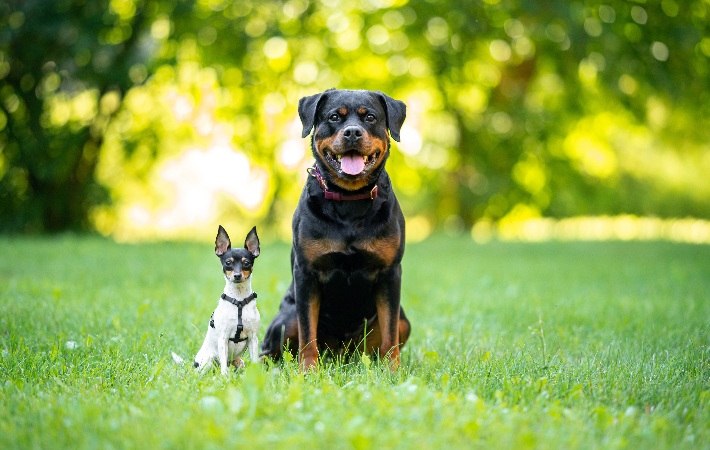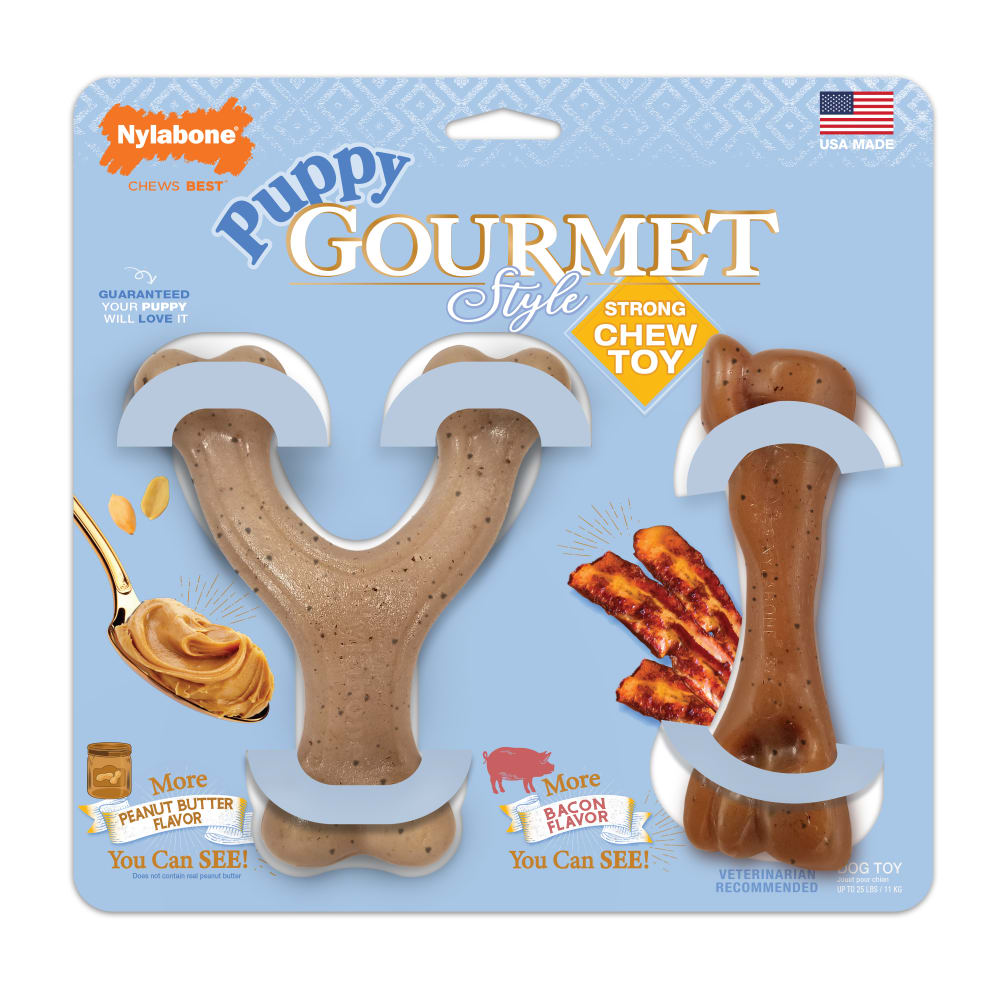Choosing a Dog Breed: 9 Factors to Consider
When it comes to choosing a dog, there are lots of things to think about: Puppy or adult? Couch companion or adventure buddy? Fancy, fluffy fur or an easy-maintenance coat? Most importantly, choosing a dog breed that matches your lifestyle will help ensure both of you enjoy a happy, loving relationship. Let these factors guide you in your search!
#1: Age
One of the first questions you should ask yourself is, “What age dog should I get?” Puppies offer pet parents a "clean slate," a chance to let your new best friend get to know you from the very beginning. Bringing home a puppy also allows you to experience and participate in all the fascinating stages of their life. Raising a pup takes lots of dedication, so make sure you have enough time, patience, and resources. Check out our new puppy checklist for everything you’ll need to prepare for their arrival.
On the other hand, welcoming home an adult dog may be a good option if you’re looking to minimize training time and potty accidents. Keep in mind that not all adult dogs are trained, however. Most dogs are quite adaptable and can shift into a new living environment with ease, as long as their basic needs are met. You can also consider caring for a senior dog if you want a docile, lower-energy companion with plenty of love to give. If you’re looking to adopt, older dogs are typically more common in shelters.
#2: Gender
Regardless of whether you want a male or female furry friend, personality varies from dog to dog. If you already have a dog and are thinking about choosing one from the opposite sex, consider spaying or neutering.
One of the most exciting things about getting a dog is choosing a name! If you’re not sure if you want a boy or girl furry friend, thinking about male dog names and female dog names can help guide your decision.
#3: Activity Level

All healthy puppies are playful, active, and full of energy. Puppies do grow up, however, and each breed has certain exercise needs. Are you an adventure lover? An active dog breed may be perfect for your lifestyle! Similarly, a dog that swims can make a wonderful choice for pet parents with pool or lake access. On the other end of the spectrum, consider a low-activity dog if you lead a more laid-back life.
It's also important to ensure you have enough space for your dog to exercise. If you live in an urban area with no backyard, dogs for apartments or condos typically have lower physical activity needs. On the flipside, if you have ample room for a dog to play, you may want to consider a more energetic furry friend.
#4: Grooming
As dogs evolved, each group developed functional coats for protection from both the elements and predators. For instance, dogs with short, smooth coats excelled at hunting because they didn't pick up burrs in the field, whereas long-coated dogs thrived in colder climates.
When figuring out how to pick a dog breed today, coat type is an important consideration because each has specific grooming requirements. If you want to minimize how much time you spend brushing, a low-shedding dog breed might be right for you. If you’re looking for a lush, flowing coat to pamper, consider one of these fluffy dog breeds!
🐶 Related:10 Low-Maintenance Dog Breeds
#5: Allergies
Is anyone in your home allergic to dog dander or saliva? While all breeds shed, hypoallergenic dogs will help minimize allergy symptoms. These breeds come in all sizes, from the tiny Bichon Frise to larger dogs like Poodles and Portuguese Water Dogs. Even if you choose one of these low shedders, you should still clean dander from your furniture frequently!
#6: Size

From the Chihuahua and Yorkshire Terrier all the way up to the Saint Bernard and Great Dane, dogs are full of physical diversity. Choosing a dog breed size that makes sense for your lifestyle is an easy starting point for picking out your pooch. For example, do you want a little lapdog you can cuddle with on the couch? Would you prefer a strong guard dog to watch over your family? You may even settle somewhere in the middle and opt for a furry friend who has elements of both.
#7: Personality
Temperament is one of the most important factors when choosing a dog breed. While every furry friend has a unique personality, different breeds are known for certain traits. If you have kids, consider a family dog breed that’s playful and easy train. Or maybe you frequently host guests and would benefit from a friendly dog breed. If you enjoy relaxing at home, consider a calm dog breed who shares your affinity for peace and quiet.
Just like our own personalities, a dog’s temperament may change as they get older. An excitable puppy, for instance, may grow up to become an agreeable, laid-back pooch. No matter their demeanor, socializing your pup will help them become a confident and well-behaved companion.
#8: Trainability
How important is it to you that your dog can do tricks or learn obedience commands quickly? Dog training is easy for some furry friends, while others may need more time to master commands. If you have plenty of patience and perseverance for training, a harder-to-train dog could offer a fun challenge. If not, an easily trainable dog breed may be better for your schedule.
While you might think an intelligent dog will be easier to train, that’s not always the case. Beagles, for instance, are great problem solvers but can be easily distracted and even a bit stubborn. Explore the different types of dog breeds to learn what they were originally bred for and how that impacts their trainability today.
#9: Compatibility with Other Pets

If you’re already a pet parent, consider asking yourself: “How can I find the right dog breed for me and my pets?” While your current furry friend may love you, they might see a newcomer as a threat. If you have a cat, you may want to narrow your search to dog breeds that get along well with cats.
Consider having your pet meet the new dog prior to officially welcoming them home to ensure they’re compatible. Look for signs like gentle sniffing, loose tail wags, and an overall calm demeanor.
Lots of Doggy Decisions!
There’s so much to think about during your search, but don’t worry: You’ll be getting a lovable furry friend no matter which breed you choose. Take your time, do your research, and start stocking up on supplies for your new pooch. Don’t forget to ask friends and family for their advice, too!
While you ponder how to pick a dog breed, check out these additional breed lists to complement your search:
- 10 Mixed Dog Breeds of All Different Sizes
- 10 Best Dog Breeds for First-Time Owners
- 10 New Dog Breeds Recognized in the 21st Century
FAQs About Choosing a Dog Breed
What size dog should I get?
Dogs range from just a few pounds up to 200 pounds! If you want a lapdog to cuddle with, consider a small dog breed. Pet parents looking for more athletic or protective dogs may be better served with a larger furry friend. It’s a matter of opinion, so ask yourself: “What’s the right dog breed for me?”
Which dogs are easiest to train?
Golden Retrievers, Poodles, and Border Collies are famous for their high trainability. Some lesser-known breeds that also tend to pick up on tricks and commands quickly include Flat-Coated Retrievers, Australian Cattle Dogs, and Nova Scotia Duck Tolling Retrievers.
Should I get a male or female dog?
Every furry friend has a unique personality, so it’s up to you! If you already have a dog and are adding a dog of the opposite sex to your family, consider spaying and neutering.
FOLLOW US!






